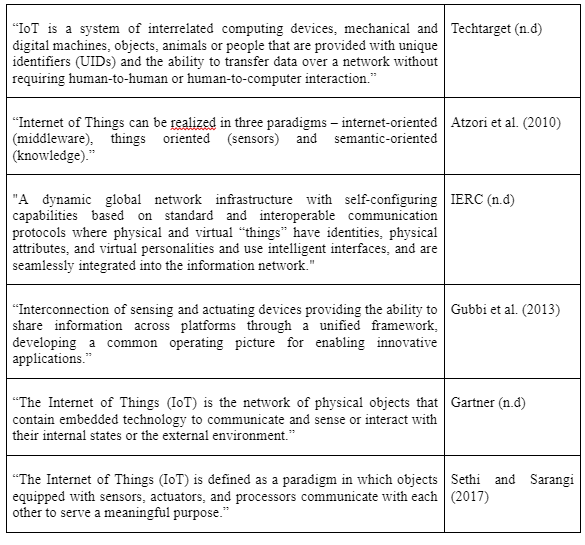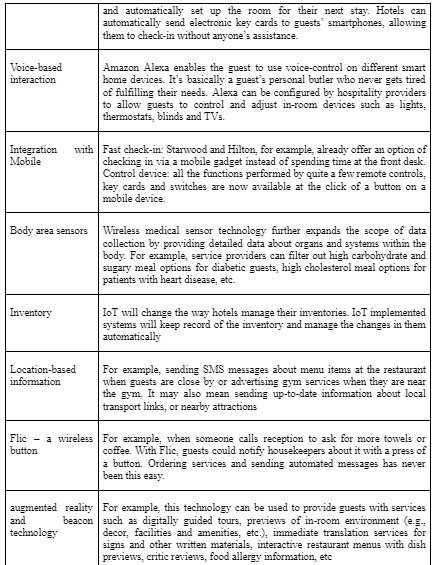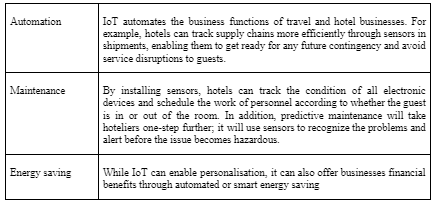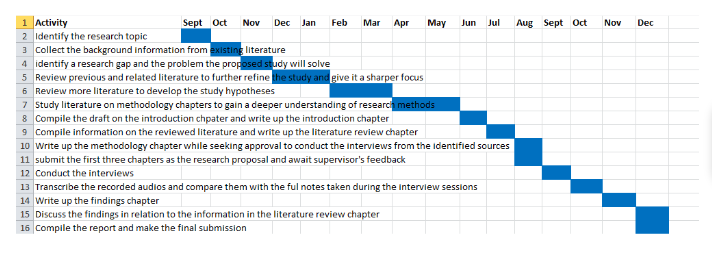The impact of Internet of Things on the Hospitality Industry
1. Introduction
This report summarises the first year of PhD research progress from September 2019 to September 2020. The research question of this particular study is Bridging the gap using IoT solutions in the hospitality industry, with the support of IoT devices is impactful in gaining the competitive advantage.

2. Research Description
2.1 Background of the Research
Digitalisation remains a major trend changing business and society today and in the future. According to Salazar (2018), technological advancements are necessary for work in the hospitality industry. In the same vein, Kansakar et al. (2019) argue that digital technology such as smart rooms, tech-savvy rooms, and greater interconnectedness among people; artificial intelligence; and domotic and IoT have brought the concept of personalisation in the hospitality industry. Analogously, Nadkarni et al. (2019) note that more and more devices are connected to the IoT which influences the hospitality industry to adopt IoT with an aim of improving guest experience and gaining a competitive advantage. Therefore, digital technology and IoT in particular has become a necessity for hotels seeking to acquire a competitive advantage. It is within this background that this study is conducted.
2.2 Problem Statement
The problem that prompts this study is the scarcity of studies exploring how the adoption of IoT technology has affected the hospitality industry. To the best of the author’s knowledge, only a few studies have explored the impact of integrating IoT on customer experience and how this helps hotels acquire and maintain a competitive advantage. Most of the studies of this nature focus on digital technology in general while this study specifically focuses on IoT and how it affects guest experience and performance. Therefore, the uniqueness of this study lies on its ability to focus on IoT as a single form of digital technology and how IoT influences guest experience and the performance of hotels.
2.3 Aim of the Research
The aim of this research is to evaluate the impact of incorporating Internet of Things (IoT) in the hospitality industry towards the experience of their guests. It includes the influence of digital experience, service, and amenities that the hotel offers to its consumers in order to gain a competitive edge. In addition, the benefits of incorporating IoT in the hospitality industry are considered with a focus on increased productivity and lower costs of operation.
2.4 Objectives of the Research
In order to achieve the aim of this research, the objectives of this research are:
To gain a better understanding of the concept of IoT
To identify the tools of IoT that are significant to the hospitality industry
To identify the factors that influence hotels to adopt IoT technology
To evaluate the impact of IoT devices on the hospitality industry in relation to guests experience and hotels gaining a competitive advantage
2.5 Significance of the Research
This study will help hotel owners, hotel operators and hotel managers to understand the tools of IoT that they can adopt in order to enhance guest experience and hotel performance. The stdy will also shed light on how IoT technology can be incorporated in hotels to make them more attractive to customers. Further, the study will provide a foundation to future researchers in understanding the possibilities and different methods that can help hotels and other organisations working in the industry to be more developed and productive. Moreover, the changing trends compel all organisations across the world to upgrade their services to match the need of consumer preferences, and therefore, this study will contribute in the understanding of the subject.
2.6 Barriers to progress
The immediate impact of Corona virus is obvious with near zero occupancy, moth-balled hotels and restaurants, closed attractions, furloughing of staff, the hospitality industry has already seen mass cancellations across rooms, events, and conferences. Furthermore, the government has ordered the closure of "hotels, hostels, bed and breakfasts, campsites, caravan parks, and boarding houses for commercial/leisure use, which makes it challenging to collect data from the targeted hotels.
3. Literature Review Progress
3.1 Literature reviews - September, October, November 2019
1. The future of Hospitality By Ajay "AJ" Aluri, Ph.D
2. An Intelligent Hotel Room By Asterios Leonidis1, Maria Korozi1, George Margetis1, Dimitris Grammenos1, Constantine Stephanidis
3. Research Directions for the Internet of Things By John A. Stankovic, Life Fellow, IEEE
4. The Influence of Wi-Fi Service on Hotel Customer Satisfaction By Geunhee Lee School of Tourism & Hospitality Management Temple University - Iis P. Tussyadiah School of Tourism & Hospitality Management Temple University
5. Energy Harvesting Techniques for Wireless Sensor By Mohammed H. Alsharif - Sunghwan Kim - Nuri Kuruo˘glu
Outcome –
1. Presentation to supervisor on findings how IOT can help hospitality industry use sensor technology, water, heating, room occupancy, location based services, Chat Bots. Reading of LoRa Technology how this impacts the hospitality industry.
3.2 Literature reviews - December 2019, January, February,
1. Determining guests’ willingness to pay for hotel room attributes with a discrete choice model By Lorenzo Masieroa,∗, Cindy Yoonjoung Heob, Bing Panc
Improving the energy efficiency of the building/restaurant using IoT sensor
2. RELATIONSHIPS BETWEEN HOTEL ROOM PRICING, OCCUPANCY,AND GUEST SATISFACTION:A LONGITUDINAL CASE OF A MIDSCALE HOTEL IN THE UNITED STATES By Anna S. Mattila John W. O’Neill The Pennsylvania State University
Outcome –
1. Literature review on The Cost Models Used by Hotels to Price Rooms, Forecasting-based pricing, Competitor-based pricing, Guest –dynamic based pricing, Occupancy-based dynamic pricing, Length of stay based pricing.
2. Collect data for 5 hotels to understand energy consumption based on water, heating, room occupancy and age groups. Conduct interviews with Hotel managers on hold to COVID 19
3.4 Literature Review: March, April, May, June 2020
1. Salazar, A., 2018. Hospitality trends: opportunities and challenges. Worldwide Hospitality and Tourism Themes.
2. Ristova, C. and Dimitrov, N., 2019. Digitalisation in the hospitality industry-trends that might shape the next stay of guests. International Journal of Information, Business and Management, 11(3), pp.144-154.
3. Leung, R., 2019. Smart hospitality: Taiwan hotel stakeholder perspectives. Tourism Review.
4. Eskerod, P., Hollensen, S., Morales-Contreras, M.F. and Arteaga-Ortiz, J., 2019. Drivers for Pursuing Sustainability through IoT Technology within High-End Hotels—An Exploratory Study. Sustainability, 11(19), p.5372.
5. Amer, M. and Alqhtani, A., 2019. IoT applications in Smart Hotels. International Journal of Internet of Things and Web Services, 6.
6. Kansakar, P., Munir, A. and Shabani, N., 2019. Technology in the hospitality industry: Prospects and challenges. IEEE Consumer Electronics Magazine, 8(3), pp.60-65.
7. Nadkarni, S., Kriechbaumer, F., Rothenberger, M. and Christodoulidou, N., 2019. The path to the Hotel of Things: Internet of Things and Big Data converging in hospitality. Journal of Hospitality and Tourism Technology.
Outcome
The intense level of competition between hotels has become a major challenge hindering hotels to maintain competitive advantage and therefore IoT technology is increasingly being adopted by hotels in order to attract new customers and retain the regular ones (Ristova and Dimitrov 2019). In the same vein, Salazar (2018) argues that hospitality service providers must stay on the leading edge of IoT technology in order to maintain a competitive edge in the market.
Applying IoT to smart hotels is attracting a lot of attention from practitioners and the most common solutions applied by hotels is Interact-Lighting which helps hotels to manage lighting and therefore save cost while adapting lighting to the preferences of individual guests (Eskerod et al. 2019). On the other hand, Leung (2019) focuses on Intelligent Hotel Room (IHR), which is an application that delivers personalised and intelligent services to guests through monitoring their locations, activities, and the smart objects within their rooms. The IHR technology allows guests to control electronic appliances in the room using Universal Remote; for example, using an intelligent laundry hanger to automatically request laundry services in the room. This technology monitors the actions of the guest and adapts the room’s behaviour to the needs of the guest based on the collected data.
Amer and Alqhtani (2019) focus on the readiness of the hospitality industry to adopt new technologies such as IoT and the results indicate that new entrants are more inclined to adopt new technologies as compared to the incumbents.
3.5 Main Points from the literature review and their relation to the study Objectives
The Concept of IoT


Tools of IoT that are significant to the hospitality industry



3.6 Research Gaps
Research on how IOT can help guests to have confidence to stay in hotels after the Covid 19 pandemic
How IOT can help online bookings, automatic kiosks for room keys, thermal CCTV cameras, and people counting
Identify the factors that are influencing hotels to adopt IoT technology
Explore how these hotels have benefited from incorporating IoT technology
4. Proposed Methods
Saunders, M., Lewis, P. and Thornhill, A., 2016. Research methods for business students (Seventh). Nueva York: Pearson Education.

1. Research philosophy – adopt the positivist philosophy
2. Research Approach – adopt the deductive research approach
3. Research Design – adopt the exploratory research design
4. Research strategy – adopt the survey research strategy
5. Sampling methods – adopt the non-probability sampling technique and particularly purposive sampling given the need to interview persons deemed to have high knowledge on the topic and application of IoT technology in hotels. Select 5 managers and organise interviews to collect data from each of them.
6. Data collection instrument – collect data using semi-structured interviews: record each interview session and take full notes during every interview session.
7. Data analysis – analyse data qualitatively using thematic and content analysis
5. Gantt Chart

Continue your journey with our comprehensive guide to The Evaluation of the Impact of Primary Schools.
- 24/7 Customer Support
- 100% Customer Satisfaction
- No Privacy Violation
- Quick Services
- Subject Experts



